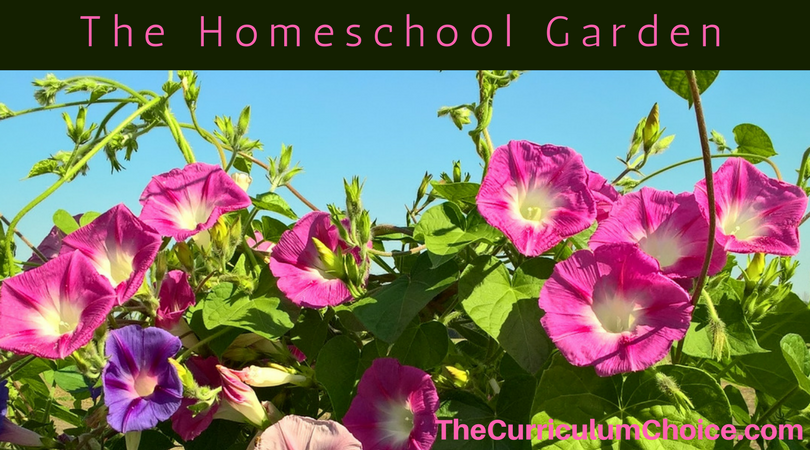Over the years, gardening has become part of our identity and it has hugely influenced all of us, in terms of learning as well as food, flowers, and skills. So, when Tricia at The Curriculum Choice was looking for someone to host a feature about gardening and homeschooling, I jumped at the chance.
What an opportunity to scroll through all our gardening posts and pictures! What memories! For example, this photo of Miss 15’s morning glories reminds me of her patience after last year’s concussion as she quietly designed flower gardens instead of complaining or crying.
And what a joy to be able to share my conviction that gardening is important—after all, the first place God put people was in a garden. Now, we know that the future paradise involves a city, a ‘people garden’ rather than a plant garden, but that does not take away God’s original command to subdue the physical earth: we are called to work with, understand, use, care for, and appreciate our own little patches of the earth as well as the whole planet. Gardening is one key to discerning what all that means, and it also gives us insight into God’s work in preparing the ‘people garden,’ as many of Jesus’ parables show.
In a slightly different vein, gardening is a deeply philosophical and religious activity. God created the world and therefore it (and people) matter simply by the fact that God made them. Not everyone believes this. Personhood theory, the idea that human beings are valuable only when they have some characteristics besides their biological humanity, is how this is expressed with respect to people. I don’t know how the related concept is expressed for the rest of the created world, but this I know: God made the world originally, upholds it now, and will renew it eventually. Because he values it, so must we. Because he told us to be busy with it, to learn about him through it, and to thank him for it, we ignore the created world at our peril. And gardening is one way to address this.
On the other hand, we do not worship the created world as some do, but the One who made it all, the One who is busy restoring it after we humans plunged it into decay. Soli Deo Gloria!
So, here’s my introduction to “The Homeschool Garden” on The Curriculum Choice, a much more practical article that grows out of these ideas.
As the world comes alive again, what better way to teach our children about nature, food, hands-on history, and practical skills than by gardening? Whether we do a formal study or make gardening a purely hands-on project, our children will learn. And whether or not our children end up being gardeners, the knowledge, the work itself, and the skills will benefit them in unexpected ways. For example, each of our children has earned money gardening for others, and one even sent me a note from an archeological dig in the Mediterranean thanking me for all the digging in the garden we had done together.
Although we aspire to rigorous homeschooling I think that some of our most important lessons have been learned while gardening. We do not formally combine gardening with lesson plans, but the simple acts of choosing and starting seeds, planning the garden layout, improving the soil, planting and weeding, managing and simplifying the work, and harvesting involve a great deal of learning. We learn about plants and weeds, about how people throughout the ages have had to work for their food, about ourselves and each other, and about the magnificent world we live in. In our gardening journey we started from nothing. You can, too.
There was the year I told my husband that we couldn’t possibly have a garden as well as homeschool because There is Too Much to Do. We discovered that gardening taught us lessons as valuable as any we’ve ever learned from school books.
Sometimes Homeschool Gardening is a break from book learning; sometimes it surpasses it.
As we work in our garden, we are close to the people who worked our soil in the 200 years it has been farmed, as well as to other food growers throughout the world. Here are some resources we have loved while Learning about the Fascinating World of Farming.
The things we learned years ago from being Gardening Homeschoolers still benefit us today.
I love teaching my children that bugs can be managed with a simple Safe, Effective, Almost-Free Bug Spray that they can make themselves.
For contributions from other veteran homeschooling gardeners, you can continue reading at “The Homeschool Garden“.
—
If you enjoyed this article, you might want to follow me on Google+, where I often mention helpful or interesting ideas, friend me on Facebook where I am just a newbie, or connect with me on GoodReads where I, eventually, share what I read. When I get around to it I will figure out how to set up a proper ‘follow me by email’ button as well; if you want me to hurry up with that, feel free to encourage me in the comments.
—
This post is linked to Inspire Me Monday, Raising Homemakers, Friendship Friday, Make My Saturday Sweet.

